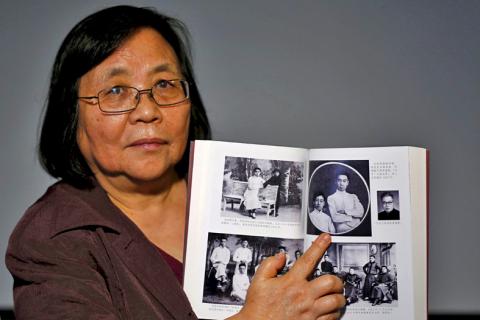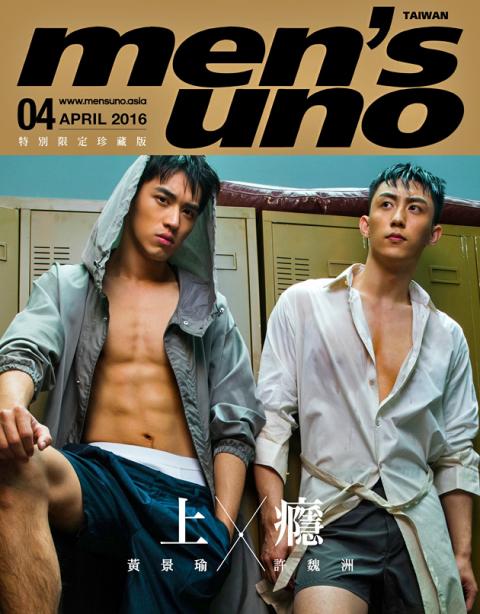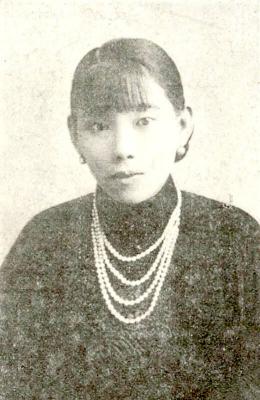The romance between Gu Hai (顧海) and Bai Luoyin (白洛因), two handsome gay senior high school students from the Web series Addiction (上癮), has caused a sensation in both China and Taiwan.
The program was seen by 10 million viewers on the day of its release in January, setting a new record for China’s television industry and was the most watched show on China’s leading video streaming sites. Netizens on both sides of the Taiwan Strait, it seemed, had become addicted to Addiction.
Then the Chinese government shut the series down.

Photo: Reuters
Early this month, Beijing issued new guidelines for television just a week after the popular gay-themed drama was pulled, banning them from including storylines involving homosexuality and other “vulgar, immoral and unhealthy” content that “exaggerates the dark side of society.”
The disappearance of the series late last month, which triggered an uproar on social media, displays “Chinese authorities’ distinct discomfort regarding homosexuality,” Time magazine reported. Such discomfort is also reflected in China’s handling of The Secret Emotional Life of Zhou Enlai (周恩來的秘密情感世界), a new book about the late Chinese premier Zhou Enlai (周恩來).
WAS ZHOU ENLAI GAY?

Photo courtesy of men’s uno Taiwan
When the Chinese Communist Party (CCP) defeated the Chinese Nationalist Party (KMT) in 1949, Zhou became the first premier of the People’s Republic of China, holding the post until his death in 1976. Charming, gentle and sophisticated in public, he presented a modern face as the country’s second most powerful man, serving as a role model for a “new China.”
But a new book, Secret, says that he may have been gay.
“Zhou Enlai was a tragic figure. He was very famous and always under the media spotlight,” the book’s author Tsoi Wing-mui (蔡詠梅) told BBC News. “But there were many aspects of his life that were like riddles and difficult to explain.”
Tsoi’s hypothesis is based on Zhou’s diary entries and personal letters, alleging that he harbored a lifelong love for a schoolmate, and that his sexual orientation would perfectly explain some “mysteries” about his life.
Tsoi said these mysteries include Zhou’s coldness toward his wife Deng Yingchao (鄧穎超), a former chairwoman of the Chinese People’s Political Consultative Conference, in a “marriage of convenience” that benefited their political purposes.
It also helps to explain his absolute obedience to Mao Zedong (毛澤東), who may have threatened to reveal his secret. After all, Tsoi stressed, homosexuality was seen as a sin against socialism because the communists, somewhat oddly, labeled it “a capitalist way of life.”
Unsurprisingly, Tsoi’s book has been banned in China. Hong Kong entertainer Wong He (王喜) was even cut from a CCTV variety show after he shared on Facebook an article about the book.
The bans on the popular drama and new book make it clear that China has yet to accept homosexuality. Indeed, the Chinese government did not decriminalize gay sex until 1997, and homosexuality was classified until 2001 as a “psychiatric disorder.” The world’s largest country by population has no openly gay politician because that would be political suicide.
LGBT CENSORSHIP
Beijing likes to show its strength through authoritarian gestures, but censorship on homosexuality, like many other human rights issues, merely shows its fear and causes considerable anger among its population.
Shanghai Pride (上海驕傲節) spokesman Matthew Baren recently said that while it is “disappointing” that Addiction has disappeared, “it’s very encouraging to see shows about homosexuality being made in China, by Chinese talent and for Chinese audiences.”
Though it was reported last week that a gay-themed variety show has been rejected by several TV stations due to the sensitivity of the issues it would tackle, Taiwan is considered relatively friendly to the LGBT community and can play a progressive role. By offering greater protection of LGBT rights, it can distinguish itself by upholding the universal value of human rights and set a good example for less progressive societies.

Many people noticed the flood of pro-China propaganda across a number of venues in recent weeks that looks like a coordinated assault on US Taiwan policy. It does look like an effort intended to influence the US before the meeting between US President Donald Trump and Chinese dictator Xi Jinping (習近平) over the weekend. Jennifer Kavanagh’s piece in the New York Times in September appears to be the opening strike of the current campaign. She followed up last week in the Lowy Interpreter, blaming the US for causing the PRC to escalate in the Philippines and Taiwan, saying that as

This year’s Miss Universe in Thailand has been marred by ugly drama, with allegations of an insult to a beauty queen’s intellect, a walkout by pageant contestants and a tearful tantrum by the host. More than 120 women from across the world have gathered in Thailand, vying to be crowned Miss Universe in a contest considered one of the “big four” of global beauty pageants. But the runup has been dominated by the off-stage antics of the coiffed contestants and their Thai hosts, escalating into a feminist firestorm drawing the attention of Mexico’s president. On Tuesday, Mexican delegate Fatima Bosch staged a

Nov. 3 to Nov. 9 In 1925, 18-year-old Huang Chin-chuan (黃金川) penned the following words: “When will the day of women’s equal rights arrive, so that my talents won’t drift away in the eastern stream?” These were the closing lines to her poem “Female Student” (女學生), which expressed her unwillingness to be confined to traditional female roles and her desire to study and explore the world. Born to a wealthy family on Nov. 5, 1907, Huang was able to study in Japan — a rare privilege for women in her time — and even made a name for herself in the

Taiwan can often feel woefully behind on global trends, from fashion to food, and influences can sometimes feel like the last on the metaphorical bandwagon. In the West, suddenly every burger is being smashed and honey has become “hot” and we’re all drinking orange wine. But it took a good while for a smash burger in Taipei to come across my radar. For the uninitiated, a smash burger is, well, a normal burger patty but smashed flat. Originally, I didn’t understand. Surely the best part of a burger is the thick patty with all the juiciness of the beef, the